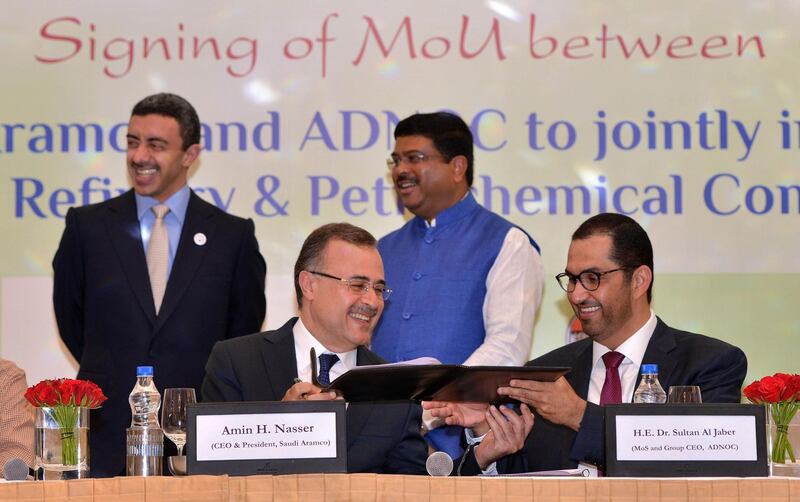Abu Dhabi National Oil Company (Adnoc) took the first step to fulfill its ambitions of developing downstream assets abroad as part of the UAE's broader Dhs400 billion five-year spending plans announced last year.
The state oil company signed a memorandum of understanding to acquire half of Saudi Aramco's 50 per cent stake in the planned $44bn Ratnagiri refinery and chemicals complex on the west coast of India.
The agreement is the first such foreign collaboration for Adnoc, which made its downstream strategy public at a regional gathering of global energy and financial sector executives in May. The announcement of downstream strategy follows the establishment of Adnoc International, the oil major's international arm last year focused on investment opportunities in the refining and petrochemicals segments of the energy business.
_______________
Read more:
[ Adnoc and Aramco to partner on $44bn Indian refinery ]
[ Adnoc seeks more value creation as it transforms into an integrated company ]
[ Abu Dhabi awards interest in offshore oil concession to Indian consortium ]
_______________
The move comes amid a region-wide pivot towards growing the downstream value chain, which began around the time of one of the lowest ebbs in the global oil prices history.
Regional national oil companies also realised that the demand for refined fuel and products in the emerging markets such as China and India will continue to hold steady, in spite of the fluctuations in the oil market. India, the world's third-biggest consumer of crude, for instance, requires 533 million tonnes of refining capacity by 2040 to meet growing domestic demand. Plans are currently underway to double capacity from 247 million tonnes to 600 million tonnes over the same period. The massive push for additional capacity would require around $300bn in investment. Such expansion also requires the building of mammoth facilities such as the 1.2 million barrels per day Ratnagiri integrated refining and chemicals complex, which once completed would be the third largest in the world after India's Jamnagar facility and Adnoc's planned Ruwais expansion.
It also makes sense for India to collaborate with countries from where it imports crude to also receive favourable price arrangements. Dharmendra Pradhan, the current Indian oil minister has been very vocal about price disparities among Asian consumers of Middle East crude. He has repeatedly called on Opec to review the so-called 'Asian premium', which is an incremental margin on the price of oil that countries such as India and China have to pay to buy crude from the Middle East.
The downstream agreement comes after several other engagements with Indian companies in developing upstream assets in Abu Dhabi. The offshore concession awards, for instance, will last 40 years and will guarantee crude off-take for India and a secured market for Adnoc.
It also seem that Adnoc and Aramco have finally appeased India's concerns about the 'Asian premium' with smart commercial maneuvering.







